UNDERGRADUATE RESEARCH BLOGS
The Office of Undergraduate Research sponsors a number of grant programs, including the Circumnavigator Club Foundation’s Around-the-World Study Grant and the Undergraduate Research Grant. Some of the students on these grants end up traveling and having a variety of amazing experiences. We wanted to give some of them the opportunity to share these experiences with the broader public. It is our hope that this opportunity to blog will deepen the experiences for these students by giving them a forum for reflection; we also hope these blogs can help open the eyes of others to those reflections/experiences as well. Through these blogs, perhaps we all can enjoy the ride as much as they will.
EXPLORE THE BLOGS
- Linguistic Sketchbook
- Birth Control Bans to Contraceptive Care
- A Global Song: Chris LaMountain’s Circumnavigator’s Blog
- Alex Robins’ 2006 Circumnavigator’s Blog
- American Sexual Assault in a Global Context
- Beyond Pro-GMO and Anti-GMO
- Chris Ahern’s 2007 Circumnavigator’s Blog
- Digital Citizen
- From Local Farms to Urban Tables
- Harris Sockel’s Circumnavigator’s Blog 2008
- Kimani Isaac: Adventures Abroad and At Home
- Sarah Rose Graber’s 2004 Circumnavigator’s Blog
- The El Sistema Expedition
- The World is a Book: A Page in Rwand
Sophia Bonfigli
Sophia Bonfigli
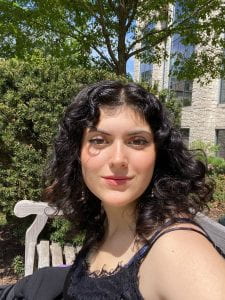
Which grant that you received do you want to talk about?
Summer URG
Please provide a brief summary of your research.
I research bioactive nanomaterials that can be used for applications in regenerative medicine. This summer, I looked at a system that uses a self-assembling nanofiber that acts like a track for dancing sliders with attached bioactive sequences. The sequence on the sliders was IKVAV, a laminin mimetic that can be used to promote adhesion and dendrite development of neurons in the brain and spinal cord.
What made you initially interested in researching your project in particular?
I loved biology and have always found regenerative medicine extremely fascinating. Using the body’s own machinery to recovery otherwise permanent or life-threatening injuries genuinely feels magical to me, so I’m so excited to be part of such impactful research.
What made you interested in pursuing (interdisciplinary) research more broadly?
I always enjoyed hearing about other people’s projects and thought it was so cool to uncover new information about the world. Research is a way to do hands-on work to satiate my curiosity and use the information I was learning in class productively. I also wanted to blend my science knowledge with artistic skills, which is something that I do often now.
Describe your experiences with research thus far. Was it tricky? What skills do you think you’ve gained?
Research can feel like a bit of a puzzle sometimes. You get to design experiments and run different tests to collect puzzle pieces, and then you use your knowledge and understanding to try and put the pieces together. I love being able to work together with others and explore new areas of science to progress in my project, all while learning new techniques and developing a plethora of skills. It can be frustrating sometimes when you can’t understand your results or don’ know how to validate a theory.
Any tips or advice you have for students similar to you that are interested in pursuing undergraduate research?
I would recommend just going for it! Nobody expects you to know anything going in, and the more you are willing to learn, the farther you can go! Being in a lab, I feel like being part of a family. You don’t need any crazy skills to jump into research.
What is something that you could give a 10 min presentation on right off the cuff?
Puppeteering
What was your favorite childhood story (written, spoken, or film)?
Spirited Away (Movie)
Rachel Spahn
Rachel Spahn
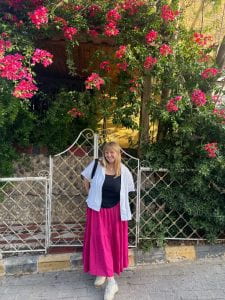
What language did you study and why?
I studied Arabic because I wanted to improve my language skills to be able to speak about complex topics, but more importantly, I wanted to better understand the language in a cultural context from native speakers.
What program did you attend and why did you choose it?
My experience at CET Jordan’s summer intensive program exceeded my expectations. I studied with CET through their semester abroad program in the fall of 2022, so I had reasonable expectations for what returning to Jordan would look like for me. Still, I was beyond pleased with how the program helped me learn Arabic through the intensive classroom experience, field-based excursions throughout the country, personalized time with professors, and the driven cohort of students.
Describe your experience doing summer language study. Was it tricky? How do you think your language skills improved?
We spent up to five hours daily speaking, listening, reading, and writing in Arabic in a classroom setting (where I worked with five other students). For example, we read and discussed a famous Arabic novel, “Men in the Sun” by Ghassan Kanafani; we watched Arabic news to discuss our course’s central theme ‘phenomena’ including the study of women’s rights, child labor, and climate change; we had weekly presentations on class topics and field-based activities, such as a presentation on our takeaways from a trip to a local radio station. We were regularly assessed on these skills and also took the ACTFL Oral Proficiency Interview at the end of the summer. Last fall, I achieved Advanced Mid and advanced to Advanced High on my interview this summer. When I studied abroad in the fall, I felt like I was learning a new word every two minutes and was solely focused on language acquisition. While I still learned hundreds of new words this summer, I was thankful that I had a different experience while language learning. I prioritized solidifying my confidence in my language skills: I would not resort to English if someone did not understand me, I learned how to speak casually and conversationally by engaging in more conversations with local shop owners and with taxi drivers, and by the end of the summer, I was able to confidently call taxis, bargain at local shops, and ask new people for help if I needed it. It became clear to me that while it is beneficial to focus on mastering words and complex structures, I could also grow my language skills by speaking in a wider variety of settings and with people from different Arabic-speaking countries. This was difficult and often made me feel vulnerable, but language learning is not linear, and I think that this experience gave me the confidence to continue making mistakes and learning from them.
Did intensive summer language study change or solidify any of your future goals? If so, how?
As for my academic development, my language acquisition from this summer will now allow me to take more advanced Arabic courses at Northwestern to complete the new Arabic minor, which I am very excited about. I also have more resources to keep practicing my language skills, including the textbooks I used in class, reading and listening to the news, and even simply staying in touch with my Arabic-speaking friends from Jordan. Through the program, I also interned at a local NGO that promotes women’s and children’s economic and social empowerment in Jordanian society. I used Arabic to translate the company’s resources and extrapolate governmental data written in Arabic. This showed me how I could use Arabic in a professional setting and especially in a way that can help people and communities, which I hope to do in the future. In particular, I would love to use Arabic to work in the government/ for a foreign policy agency to facilitate cross-cultural and multi-national discourses. Not only did the summer solidify my career goals, but I also learned a lot more about how I learn and can support others with their learning. It was challenging to commit to the language pledge when it would be a lot easier to resort to English with my student cohort. But our commitment to each other and ourselves and as a result, our much-improved language skills, taught me a lot of perseverance and resilience. Immersing myself in a new language and culture was uncomfortable at first. It made me a lot more grateful for my friendships and support systems, especially the locals I met that were patiently willing to listen to me stumble over words sometimes. I appreciated learning about a new culture and environment by living in it, and I am forever thankful to CET, my program, and the ULG for showing me I could.
Do you have any tips or advice for students similar to you that are interested in pursing intensive language study?
If you are studying in a new country, find communities and places that connect you to home! My program required me to speak exclusively in Arabic for the whole summer; I felt more comfortable exploring new areas while listening to my favorite songs in English and sometimes just drinking a mocha from Starbucks. I started writing down one good thing that happened and one thing I was grateful for every day, which was SO grounding! I also love looking back and reading about my experience now that I’m back at NU. Give yourself some grace. Prioritize self-care. You’ve got this!
What is something that you could give a 10 min presentation on right off the cuff?
Why the color green is the best color ever
Fatima Shafiq
Fatima Shafiq
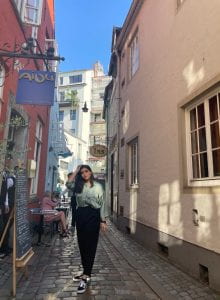
What language did you study and why?
German because I plan on doing my Journalism Residency and my masters in Germany
What program did you attend and why did you choose it?
I chose Goethe because it is recognized for its immersive program and skilled teachers.
Describe your experience doing summer language study. Was it tricky? How do you think your language skills improved?
My daily schedule was packed, with classes from 8:00 AM to 1:00 PM, followed by an intensive private lesson lasting 1 hour and 45 minutes. I also took online lessons that exceeded my 120 hours to practice my German further. This demanding routine was hectic but incredibly effective in making me fully immerse in the German language. It pushed me to the limits of my language abilities and compelled me to adapt quickly. The program’s quality was exceptional in every aspect. The language instruction was top-notch. Our instructors were dedicated to ensuring we remained fully immersed in the German language, and they discouraged us from speaking in our native languages. Group assignments, pair work, and regular tests challenged us to apply what we learned in class actively. Homework was a routine part of our studies, and it was diligently checked and discussed during our lessons. What truly enhanced my experience was the opportunity to interact with other students in the program. I made friends from various backgrounds, including a Dutch-Colombian friend, an Italian, and a Turkish classmate, among others. We organized post-class hangouts, where we practiced speaking in German and supported each other’s language learning journeys. These friendships remain strong, and we continue to communicate in German. The Goethe Institute also organized daily activities, such as visits to Kunst Halle (Art Museum), bar outings, beach trips, and A1 practice sessions. Participating in these activities not only exposed me to different aspects of German culture but also allowed me to make lasting connections with fellow participants. Interacting with the local community and native speakers was another invaluable aspect of my program. Whenever I went grocery shopping or ordered food, I conversed with locals in German. They were friendly and corrected my mistakes, creating a comfortable and supportive learning environment.
Did intensive summer language study change or solidify any of your future goals? If so, how?
It has equipped me with the language skills needed to pursue my dream of doing my masters in Germany and working in German media organizations. With a strong foundation in German up to B1 level, I am well-prepared to excel in my future academic endeavors and professional pursuits. My competence in German has enormous potential for enhancing my academic ambitions. Journalism and strategic communication are disciplines that need a global perspective as well as the capacity to communicate successfully across cultural boundaries. German proficiency provides the door to a multitude of academic resources, research opportunities, and networking chances in Germany, a country noted for its expertise in media and communication studies. It has positioned me favorably for my Journalism Residency and professional opportunities with esteemed German media organizations like Deutsch Welle, Der Spiegel, and Reflectist, which require a high level of language proficiency.
Do you have any tips or advice for students similar to you that are interested in pursing intensive language study?
Embrace your passion for learning a new language wholeheartedly, dedicating your entire effort. Pursue this endeavor not solely for monetary gain, but as a means to acquire a valuable skill in the form of a new language. The experience of learning a new language is exceptionally rewarding, extending beyond linguistic proficiency. It offers a profound understanding of the culture, traditions, and values of the people and country associated with that language.
What would you name a boat if you had one?
Not Titanic
What is something that you could give a 10 min presentation on right off the cuff?
Pakistan’s political crisis
If your (speaking) voice were an instrument, what do you think it would be?
A sitar (South Asian instrument)
What was your favorite childhood story (written, spoken, or film)?
Interstellar
What was a memorable interaction that you had on campus this week?
I met Laila Al-Arian, a Journalist from A l Jazeera English
Jason
Jason Yang
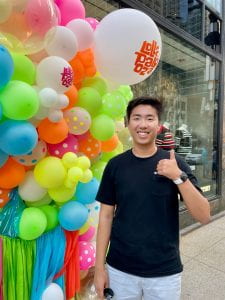
Please provide a brief summary of your research.
The sense of touch is critical for humans, and our daily interactions with objects require accurate tactile perception. To better understand the associated neural processes, functional magnetic resonance imaging (fMRI) during tactile stimulation can identify how tactile signals travel within the central nervous system. However, there is a lack of stimulators that provide constant forces resembling the natural grip forces used in object manipulation. We developed a novel system that delivers accurate, localized, and automated constant-force stimulation that can be used in studies of tactile perception in various populations, such as those with stroke.
What made you initially interested in researching your project in particular?
I have always had an interest in the technology behind medical imaging, and I find it fascinating that we have the capability to see within the body. When I joined the Robotics and Sensorimotor Control Lab, which was focused on researching how humans perceive somatosensory signals, I wanted to integrate neuroimaging into the study of tactile perception. My PI and I worked together to develop a new research direction utilizing fMRI to study the neural correlates of tactile perception.
What made you interested in pursuing (interdisciplinary) research more broadly?
I enjoy trying to tackle complex challenges on the forefront of a particular topic, and I find it rewarding that my work will eventually have a real impact on people around the world. I also love the interdisciplinary aspect of research and being exposed to so many different industries and fields. Collaborators on my project included roboticists, mechanical engineers, computer scientists, neuroscientists, and more!
Describe your experiences with research thus far. Was it tricky? What skills do you think you’ve gained?
Over the 2-3 years that it took to complete my research, there were certainly some challenges. I think the hardest part was trying to coordinate the different components of the project and ensuring that each team knew what the end goal was. I definitely developed skills in effective communication and delegation. Also, while it was daunting at first, I found it especially rewarding to be able to work and make decisions independently. My experience with research has certainly prepared me for working in the “real world.”
Any tips or advice you have for students similar to you that are interested in pursuing undergraduate research?
I would say to find something you are truly interested in, especially if you plan on starting a project and following through with it to the end. On this point, I think finding a lab or PI that allows you to take control over a project is especially important. Being able to go through the whole “scientific method” was the best way for me to develop my research skills.
If you had unlimited time, money, resources, support, etc. what is something you would research?
How to cure color blindness (I’m color blind…)
Favorite bathroom on campus?
First floor of Bienen
Lynn
Lynn Ahn
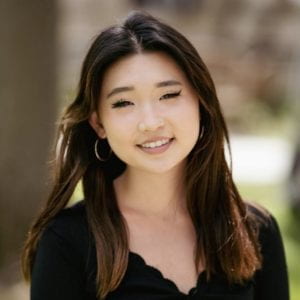
Please briefly summarize your research.
As an Emerging Scholar, I conducted literature reviews, critically analyzed testimonios, and edited Dr. Alyssa Garcia’s manuscript, Moral Discourses, Regulated Bodies: Sex, the State, and Subjectivity in Cuba.
What made you interested in pursuing (interdisciplinary) research more broadly?
I was interested in getting hands-on experience with research and academia.
How has it been working with faculty to transition from an assistant position to a more independent role?
Working with a faculty mentor helped with independent research because I was able to get experience before starting my own project. It made starting an independent project less intimidating.
What’s been your favorite part about being in a cohort with other scholars?
My favorite part has been the community, especially with people who share similar experiences to me.
Do you have any tips or advice for first years similar to you who are interested (but maybe hesitant) to apply for a 15 month long program?
You should go for it! It is intimidating but it is a great experience. It isn’t easy, but you will learn a lot.
If you had unlimited time, money, resources, support, etc. what is something you would research?
Victim’s Economic Security and Safety Act, Employment protections for survivors of sexual and domestic violence
Favorite bathroom on campus?
Lincoln has the best bathrooms
What’s the most interesting thing you’ve learned/read about/listened to this week?
I finished On Earth We’re Briefly Gorgeous yesterday!
What is your most useless talent?
I’m really good at putting on fake eyelashes
Ana
Ana de Souza
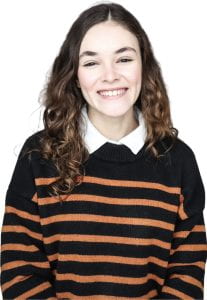
Please provide a brief summary of your research.
Anterior temporal lobectomy (ATL) involves the surgical resection of left or right medial temporal lobe (MTL) structures to control seizures in 80% of patients with medication-resistant temporal lobe epilepsy (TLE). MTL supports the formation and retrieval of memories for past experiences, so the benefits associated with ATL must be balanced with the risks of memory decline. Currently, presurgical memory lateralization relies on an invasive procedure called the Wada test, which can be inaccurate, particularly in younger children or those with developmental delays. This project aims to improve memory outcomes in pediatric TLE patients by using fMRI to determine memory lateralization prior to left or right ATL. To achieve this, we designed two memory tasks to be performed in-scanner, one examining associative memory and one examining naturalistic event memory. In healthy participants, we hypothesize bilateral MTL activation during the performance of both tasks. In patients with left or right TLE, we hypothesize greater activation lateralized to the non-epileptic MTL. Now, we are leading pilot testing of the memory tasks and subsequent data collection in healthy children and adolescents. Once we analyze the data, we plan to recommend one or both tasks to be paired with fMRI and employed in the presurgical evaluation of pediatric TLE patients. We further plan to pair the tasks with intracranial EEG during presurgical monitoring to examine the neurophysiological mechanisms underlying fMRI effects. We hope the findings of this project indicate that our clinical memory task method can replace the Wada test for patients being considered for ATL.
What made you initially interested in researching your project in particular?
My major (Industrial Engineering) is not related to this area, but I took an Intro to Psychology class and became genuinely interested in Neuroscience topics. I wanted to learn more about it and I also thought it would be fun to work with kids when we got to the data collection phase! My major is very quantitative (a lot of Statistics and Computer Science), so I was very excited about applying my theoretical knowledge to this project, especially because I was so interested in it.
What made you interested in pursuing (interdisciplinary) research more broadly?
First, I wanted to find a hands-on experience to apply all the theoretical things I am learning at Northwestern. Second, I was curious about what doing research would be like; I had never been part of a research project before and wanted to try it out.
Describe your experiences with research thus far. Was it tricky? What skills do you think you’ve gained?
I had a great experience! Dr. Johnson (my faculty mentor) was very supportive and willing to teach me. While I was coding the behavioral tasks, I also had a lot of autonomy, which was very exciting. Though this project, I ended up discovering I really enjoy Neuroscience! The projects I am working on are challenging but the support of my lab and my genuine interest in the research keep me going. Two of the most important skills I’ve gained are not being afraid to ask for help and not running away from challenges.
Any tips or advice you have for students similar to you that are interested in pursuing undergraduate research?
Find something that you are genuinely interested in – this will make a huge difference in the long run! Also, don’t give up on finding a lab and use the Office of Undergraduate Research resources.
If you had unlimited time, money, resources, support, etc. what is something you would research?
I would still research the same thing!
What is your most useless talent?
If I feel tired, I can sleep anywhere. And I really mean anywhere.
Betty
Betty Dong
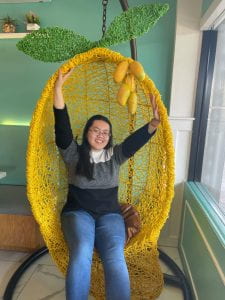
Please provide a brief summary of your research.
I helped Melissa gather sources from academic papers to video interviews for a book about history of Hip-Hop— from its origins to various stylistic methods that artists implement today. In addition, I also worked on restyling some presentations for her vocal classes.
What made you initially interested in researching your project in particular?
I like music and history! I wanted to get exposed to more types of music and be more knowledgeable in regards to different cultures and genres. Melissa was also a lovely faculty-in-residence for the South Area last year <3
What made you interested in pursuing (interdisciplinary) research more broadly?
I like many things but I wasn’t sure if I should do research, so I just decided to try it out. Interdisciplinary fields seem to flow naturally with any subject, since the world is connected to each other.
Describe your experiences with research thus far. Was it tricky? What skills do you think you’ve gained?
Overall, it was really fun! I had the opportunity to both enjoy summer and learn more about how to actually do research. I think time management and clear communication were skills that I’ve gained throughout this experience.
Any tips or advice you have for students similar to you that are interested in pursuing undergraduate research?
Try it out! If you like it, that’s great. If you don’t, at least you know you won’t be a researcher for the rest of your life. No regret-life.
Favorite bathroom on campus?
One of the fancy ones in Kellogg or the Allen Center
What’s the most interesting thing you’ve learned/read about/listened to this week?
Sign — ONEW
Ani
Ani Feinberg
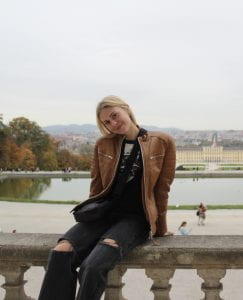
Please provide a brief summary of your research.
Last summer, I had the privilege of working with Professor Larissa Buchholz to create a systematic literature review for her research project on the globalization of art and cultural production. Literature reviews are an essential first step in any research project because they help the research team gauge how much information is available on their topics of interest, as well as the types of questions that have already been asked. Using the online platform Endnote, I developed of bibliographical archive of all the pre-existing research and writing that was relevant to art and globalization. Towards the end of the summer, I worked on analyzing all this literature, identifying common themes and significant patterns that guided Professor Buchholz in her own research the following fall.
What made you initially interested in researching your project in particular?
I was initially drawn to this research project because of my interests in International Affairs and my background in the arts world. I was a ballet dancer all throughout high school (and briefly into college!), and I felt that Professor Buchholz’s work was the perfect blend of this particular passion and my separate academic pursuits. In the classroom, I have studied quite a bit how globalization has impacted the world economy, politics, and social activism–however, before joining this project, I had yet to truly explore the intersection of globalization and art forms (such as dance, poetry, painting, films, music, etc.). It is truly fascinating to question what motivates humans around the world to share, invent, and mimic these different practices. Professor Buchholz’s project allowed me to explore a field of study I was both extremely unfamiliar with and highly curious about.
What made you interested in pursuing (interdisciplinary) research more broadly?
I am a firm believer that the research process teaches valuable practices that can be applied to almost any career path. I knew that by pursuing some form of research, I would help to improve my organizational, collaborative, and analytical skills enormously.
Describe your experiences with research thus far. Was it tricky? What skills do you think you’ve gained?
My experience was definitely not easy. Prior to this research, I did not have much experience with coding or computer software tools, and it took a good amount of practice to get to a place where I was comfortable inputting all of our work into various online databases. Nonetheless, this just reminded me of my ability to learn quickly and adapt to changes, even well into my college career. I walked away from this experience feeling much more confident using technology as a means for more efficient research collection and analysis.
Any tips or advice you have for students similar to you that are interested in pursuing undergraduate research?
Even if you do not think it will be an important aspect of your career later on, give undergraduate research a try! There’s no better time to try new kinds of work and learning than in college. You have nothing to lose with research–only skills to be gained.
Elizabeth
Elizabeth Hyun
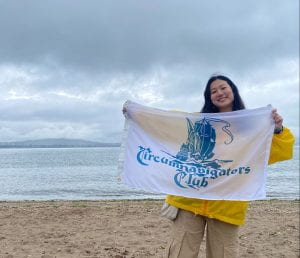
Can you briefly summarize your project and share what made you initially interested in that topic?
My project focused on psychological trauma across 5 different countries: Argentina, Northern Ireland, Bosnia, Japan, and South Korea. I became interested in this topic while taking a class on trauma in the Global Health Department in the fall of my Junior year. In the class, I realized that I had a lot of questions about trauma and mental health. For example, I was curious about how perceptions of trauma and spaces for trauma care differed across distinct cultural contexts. My research this summer helped me to answer some of these questions and allowed me to learn from incredible experts in the field.
What was the most unexpected or challenging part of your trip?
The most challenging part of my trip was conducting interviews with multiple language barriers. Even though most of my interviewees were fluent in English, it was still difficult to translate some words regarding trauma and psychology. Also, there are always words that don’t completely translate into another language. So, when my interviewees would talk about their life experiences, sometimes it was challenging to authentically understand their experiences and emotions.
In what ways do you think circumnavigating the globe helped you grow?
I think this is a tough question and one that I am still in the process of realizing. I believe that this trip helped me to grow in many different ways. I learned how to enjoy my own company, how to become comfortable with being uncomfortable, and how to connect with people from different backgrounds and across different ages. I learned the importance of flexibility and open-mindedness in traveling. Finally, I learned that there are many different versions of living a successful, happy, and meaningful life, that there isn’t just one designated way for doing things.
What did you miss most from home while you were abroad?
My friends and family. And AC.
Do you have any advice for students interested in the Circumnavigator Grant?
My advice for anyone interested in this grant would be to apply. I think that this is a once in a lifetime opportunity and the rewards from this experience outweigh the challenges during the application process. Also, there are so many people at Northwestern who are here to support you!
Morgan
Morgan Willison
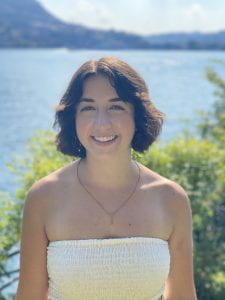
Please provide the tile and a brief summary of your research/conference presentation.
Title: How Do Transgender and Non-Binary College Students Define ‘Having Sex’? My research investigated how transgender and non-binary college students define the phrase ‘having sex’ and the factors that influence those definitions. I interviewed 8 self-identified non-cisgender college students and used a phenomenology framework of analysis to code for significant themes. The findings of my research reveal how participants’ gender identities impact their sexual experiences and highlights their need to redefine and construct their own definitions of ‘having sex,’ outside of the cis-heteronormative definitions that they learned from Sex Education classes, popular media, or their peers.
What made you initially interested in researching your project in particular?
In my first sexuality studies class at Northwestern (shout out Introduction to Sexuality Studies with Professor Fenrich), we had a guest lecture by Linguistics Professor Gregory Ward on how several populations define ‘having sex.’ Looking at the existing scholarship, I realized how each study, even the queer-friendly ones, relied on a strict gender binary and the conformity of its participants’ bodies to cisgender norms. I was interested in adding transgender and non-binary voices to this incredibly important conversation that affects sex education curriculum, medical inquiry into sexual behavior, and support for sexual well-being.
What conference(s) did you present at and how did you find out about them?
Moving Transgender History Forward 2023 at the University of Victoria; I was looking for places to submit my work as I had just begun writing up the final article and got really lucky to stumble upon their information!
What was it like presenting at a conference? Anything that you didn’t expect?
I presented a virtual poster so I actually got to record a video presentation to submit before the conference began. I really appreciated that as it eased some of the nerves of presenting my research for the first time. As the conference wasn’t only for undergraduates, I went in expecting no one to be interested in my work, as they were mostly graduate students and professors but everyone was really kind! Throughout the conference, so many people asked about my work and future interests and even offered to put me in contact with others working on similar projects!
Any tips or advice you have for students similar to you that are interested in presenting at a conference one day?
I would absolutely recommend it. If you’re anxious about presenting in front of a crowd, look for virtual options so you know your presentation is already complete and you can focus on learning from and talking with others! Also, it can be intimidating to ask questions of presenters but I haven’t had a bad experience yet, and usually they’re just thrilled someone is interested in learning more. A great question to ask if you’re not sure what to say but want to start a conversation with them is “was there anything really interesting about your research that you didn’t get to share in the presentation?”
What is your most useless talent?
I can make my tongue roll into a clover shape!
